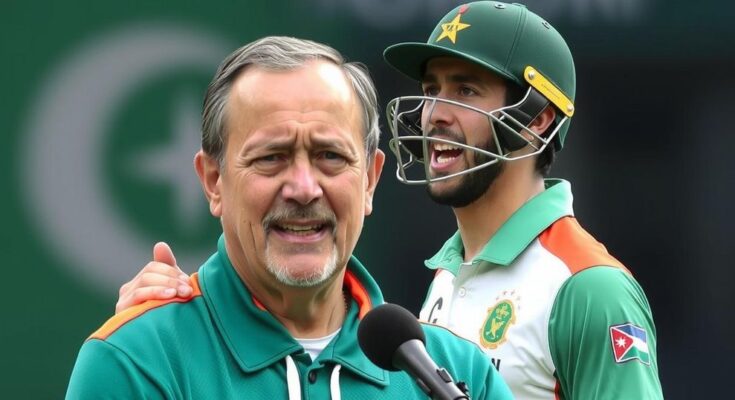South Africa’s Sports Minister Gayton McKenzie supports a boycott of Afghanistan in the upcoming ICC Champions Trophy. He has joined British politicians urging cricket authorities to reconsider their match schedule due to Taliban-imposed restrictions on women’s rights since returning to power. McKenzie emphasizes the moral implications of participating against a nation with such policies, amid increasing calls from the international community for unified action against human rights violations.
South Africa’s Sports Minister, Gayton McKenzie, publicly endorsed calls for a boycott of Afghanistan in the upcoming ICC Champions Trophy scheduled for February 21 in Pakistan. His statement aligns with the sentiments expressed by British politicians advocating for England’s withdrawal from matches against Afghanistan due to the Taliban’s oppressive policies towards women since regaining power in August 2021. McKenzie emphasized that the governing bodies, including Cricket South Africa and the ICC, must reflect on the implications of participating against a nation with such a controversial stance on women’s rights.
Despite acknowledging that the decision lies beyond his purview, McKenzie expressed a personal conviction against honoring the fixture. He remarked, “As a man who comes from a race that was not allowed equal access to sporting opportunities during Apartheid, it would be hypocritical and immoral to look the other way today when the same is being done towards women anywhere in the world.” This perspective underscores a moral imperative against the backdrop of sports and social justice, urging a unified response from the cricketing community against human rights violations.
In addition to South Africa’s stance, over 160 British politicians have co-signed a letter urging the England and Wales Cricket Board (ECB) to consider withdrawing from their match scheduled for February 26 in Lahore. In response to the pressure, ECB chief executive Richard Gould has called for a coordinated action among all participating nations regarding Afghanistan’s involvement in international cricket. Furthermore, Cricket Australia had previously postponed a T20 series against Afghanistan due to deteriorating human rights conditions but engaged Afghanistan in matches during the World Cup last year. In a recent statement, Cricket Australia chairman Mike Baird expressed pride in their stance, affirming their commitment to standing against human rights abuses.
The context of the growing calls for a boycott of Afghanistan’s cricket team stems from the Taliban’s return to power in Afghanistan in August 2021, which has led to severe restrictions on women’s rights, particularly in sports. This situation has incited international criticism and prompted various nations and their cricket boards to reassess their engagement with Afghanistan in sports. Both England and South Africa face public and political pressure regarding their scheduled matches during the ICC Champions Trophy, with calls for action emphasizing moral responsibility in the face of human rights violations.
In summary, South Africa’s Sports Minister, Gayton McKenzie, has strengthened the movement advocating for a boycott of Afghanistan in the ICC Champions Trophy, reinforcing that cricketing entities must consider the broader implications of their participation. With strong support from political figures and amidst growing scrutiny from the international community regarding human rights in Afghanistan, the decision about future fixtures remains increasingly complex and ethically charged, emphasizing the intertwining of sports with global human rights issues.
Original Source: www.aljazeera.com




